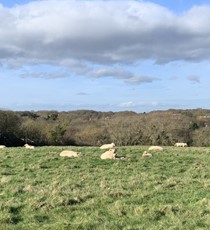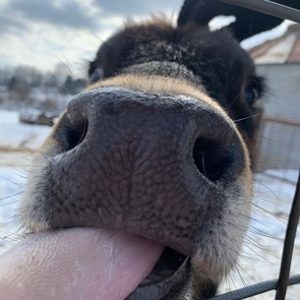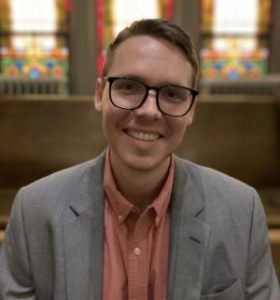The Word
Genesis 1:29-30
29 God said, “See, I have given you every plant yielding seed that is upon the face of all the earth, and every tree with seed in its fruit; you shall have them for food. 30 And to every beast of the earth, and to every bird of the air, and to everything that creeps on the earth, everything that has the breath of life, I have given every green plant for food.” And it was so.
Being with the Flock
It was a sunny, unusually warm, winter afternoon in pre-pandemic 2020 when I had what I can now see as an “a-ha” moment. I had been having an inner struggle of sorts; I couldn’t see where God was calling me. That afternoon I had done what I usually did when the weather broke, go for a short stroll to clear my mind through the Kentish pastures of southern England that I love. A stone’s throw away from my university was a small farm where sheep graze. A baby had just been born, and as the sun warmed me, that precious lamb, and everything else in that slice of creation, I had the strongest desire to leap over the fence and lay down with the flock. I didn’t (that would be trespassing), but I really wanted to.

The sheep in the pasture that I would often walk by in Canterbury, England
My Lenten Fast
Something clicked for me that day. People close to me pushed me to think about that impulse, and to appreciate the Biblical imagery that it harkened to, shepherding to be specific. I always loved animals. My junior year of undergrad I went vegetarian for Lent after taking a course called “Environmental Ethics.” I learned how our choices as consumers, including the foods we choose to eat, contribute to environmental degradation or wellbeing. The diets we follow have an impact. A report by the Yale School of Forestry shows animal agriculture takes up about 80% of farmland but provides only 18% of the calories we consume. Now three years later, my Lenten practice is to go vegan. For me and many other Christians around the world and throughout history, Lent is a time to enter into a fast in an effort to bring oneself closer to God and become immersed in creation.
Living for Creation
Prior to my graduate studies in England, I thought I was meant to be an academic. Being abroad, however, gave me time and opportunities to distance myself from what I had been accustomed to. My eyes and ears opened to the “labor pains” of creation, as St. Paul calls it, and I felt the pull to live my life for God and God’s creation. I hope that through my fasting, study, and work that I might bring about a shred of Isaiah’s vision of the kingdom of God into existence in this time and place.
Isaiah 11:6-9
6 The wolf shall live with the lamb,
the leopard shall lie down with the kid,
the calf and the lion and the fatling together,
and a little child shall lead them.
7 The cow and the bear shall graze,
their young shall lie down together;
and the lion shall eat straw like the ox.
8 The nursing child shall play over the hole of the asp,
and the weaned child shall put its hand on the adder’s den.
9 They will not hurt or destroy
on all my holy mountain;
for the earth will be full of the knowledge of the Lord
as the waters cover the sea.
Looking Beyond Lent
Now as a soon-to-be seminarian and aspiring ordained minister in the ELCA, I look beyond Lent, to how I can bring others into the radical vision of this future world; a kingdom we can only glimpse but know that it is there. Diet and fasting are not always options; economic insecurity, food deserts, and certain disabilities limit options, but there’s still much to be done. For me, a diet based in nonviolence and answering a vocational call in pastoral care and advocacy are how I can contribute to creation care. I pray that this season of Lent may be a time for us all to consider how we might, in our own ways, take a step toward a world in which all God’s creatures may “lie down together.”

A calf I’ve befriended near my home in central Pennsylvania
Discussion Questions:
- How do the choices you make as a consumer impact your local environment? How do they impact environments around the world?
- What sacred texts or Biblical passages inspire you to work to be a good steward of creation?
- What could fasting for creation look like to you, your congregation, and your community? Is fasting something that everyone can participate in equally? Why or why not?
 Larry Herrold is the ELCA Hunger Advocacy Fellow with the Lutheran Advocacy Ministry in Pennsylvania (LAMPa) office in Harrisburg, Pa. A native of Sunbury, Pa., where the east and west branches of the Susquehanna River meet, he graduated from Susquehanna University in 2019 with a BA in History and Religious Studies. He received a MA in Modern History from the University of Kent in England, where he completed a Fulbright Scholarship. Herrold is deeply committed to the intersection between ecclesiastical service, social justice, and tradition. He will be attending Pacific Lutheran Theological Seminary beginning Fall 2021 to earn his MDiv, pursue rostered leadership, and learn more about incorporating eco-justice into ecclesial ministry.
Larry Herrold is the ELCA Hunger Advocacy Fellow with the Lutheran Advocacy Ministry in Pennsylvania (LAMPa) office in Harrisburg, Pa. A native of Sunbury, Pa., where the east and west branches of the Susquehanna River meet, he graduated from Susquehanna University in 2019 with a BA in History and Religious Studies. He received a MA in Modern History from the University of Kent in England, where he completed a Fulbright Scholarship. Herrold is deeply committed to the intersection between ecclesiastical service, social justice, and tradition. He will be attending Pacific Lutheran Theological Seminary beginning Fall 2021 to earn his MDiv, pursue rostered leadership, and learn more about incorporating eco-justice into ecclesial ministry.
